An unexpected flight cancellation.
Suddenly, there’s a surge of passengers scrambling to rebook, and your customer support gets flooded with hundreds of inquiries. For airlines, airports, and travel agencies, these moments aren’t rare, they’re daily challenges. Long wait times, overwhelmed agents, and frustrated travelers create operational chaos and brand damage.
If you run a travel business, you know the struggle.
Your team works hard to assist every customer. But with unpredictable travel disruptions and constant inquiries, scaling your support without losing efficiency feels impossible. You need a way to automate repetitive tasks without sacrificing the personal touch.
This is where travel chatbots come in.
These AI-powered assistants instantly respond to inquiries, help customers rebook flights, suggest travel itineraries, and even handle refunds. Whether you’re an airline, a hotel, or a travel agency, integrating a chatbot can transform your operations, improve customer experience, and reduce costs.
Improve your business results using travel chatbots
Travel AI chatbot
Travel chatbots are AI-powered virtual assistants that provide 24/7 support to travelers in human language. They assist with trip planning, booking, real-time updates, and personalized recommendations through a variety of channels, like websites, mobile apps, and messaging platforms. Acting as digital travel companions, these chatbots enhance customer experiences from the first inquiry to post-trip support.
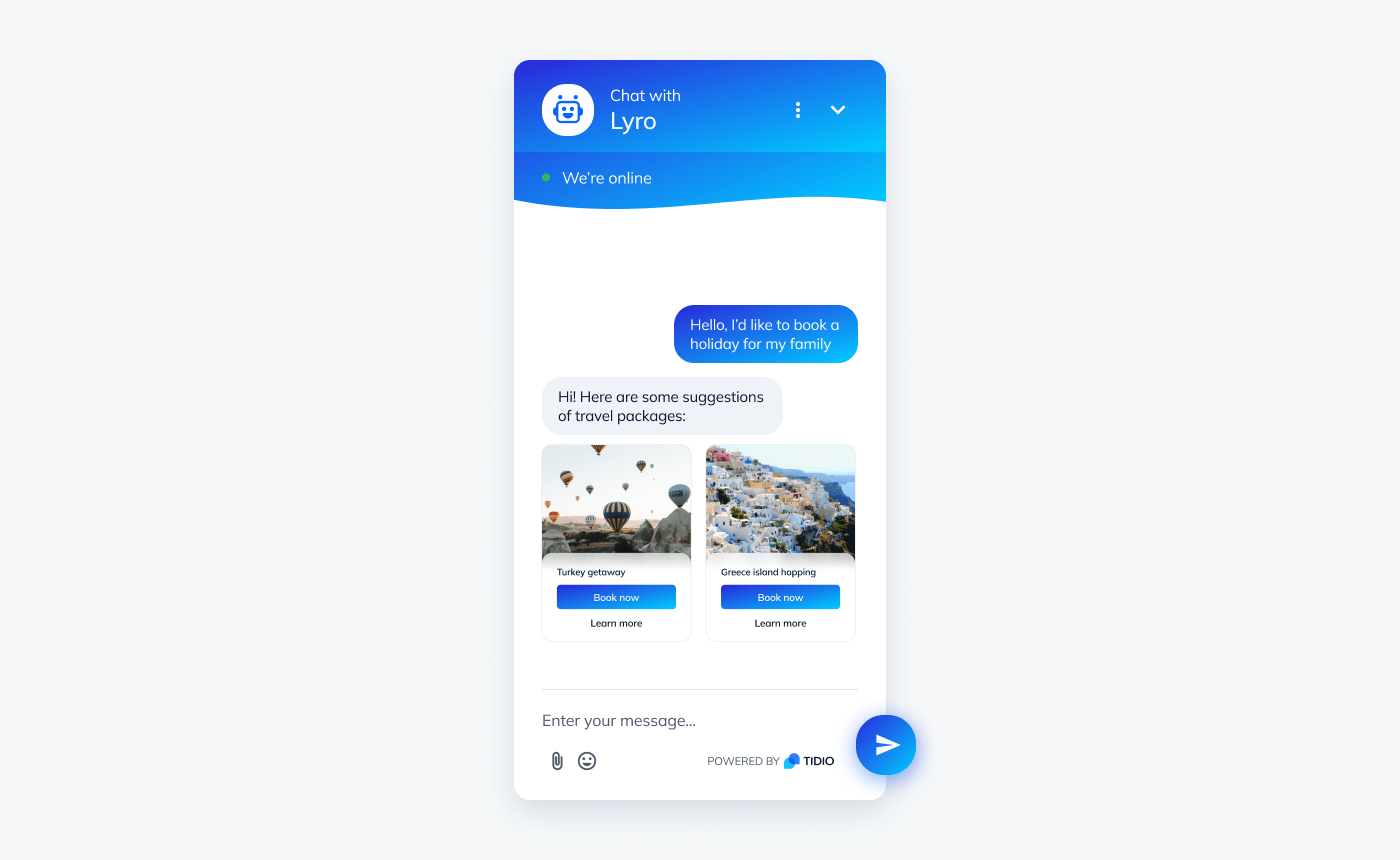
When we say ‘travel chatbot’ you might be thinking of different types. So, let’s distinguish them and provide some real-life travel chatbot examples:
3 main types of AI travel chatbots
User-friendly AI agents help airlines, airports, and travel agencies automate repetitive tasks and respond to inquiries Not all travel chatbots are the same. Depending on the algorithms of the system, this technology can be divided into three main categories:
AI for airlines
Artificial intelligence is making flight travels smoother, smarter, and more efficient. AI-powered virtual assistants, like KLM’s BlueBot, provide instant support, help with bookings. Airlines like Delta Air Lines are using AI to personalize the passenger experience, such as offering tailored in-flight entertainment recommendations. Furthermore, AI is streamlining baggage handling, with companies like SITA developing AI-powered tracking systems to reduce lost luggage.
Also, airlines are increasingly using AI to analyze vast amounts of real-time and historical data to predict potential issues before they escalate. For instance, Boeing’s Airplane Health Management system continuously monitors aircraft in flight to identify anomalies and forecast maintenance needs proactively. Similarly, Airbus’s Skywise platform utilizes AI to analyze in-flight data, enabling airlines to optimize flight routes for fuel efficiency and predict potential malfunctions.
Ultimately, AI is transforming air travel into a stress-free, streamlined experience. Airlines save costs, and travelers enjoy a smoother journey from check-in to landing.
An example of a chatbot that airlines can use is Lyro:
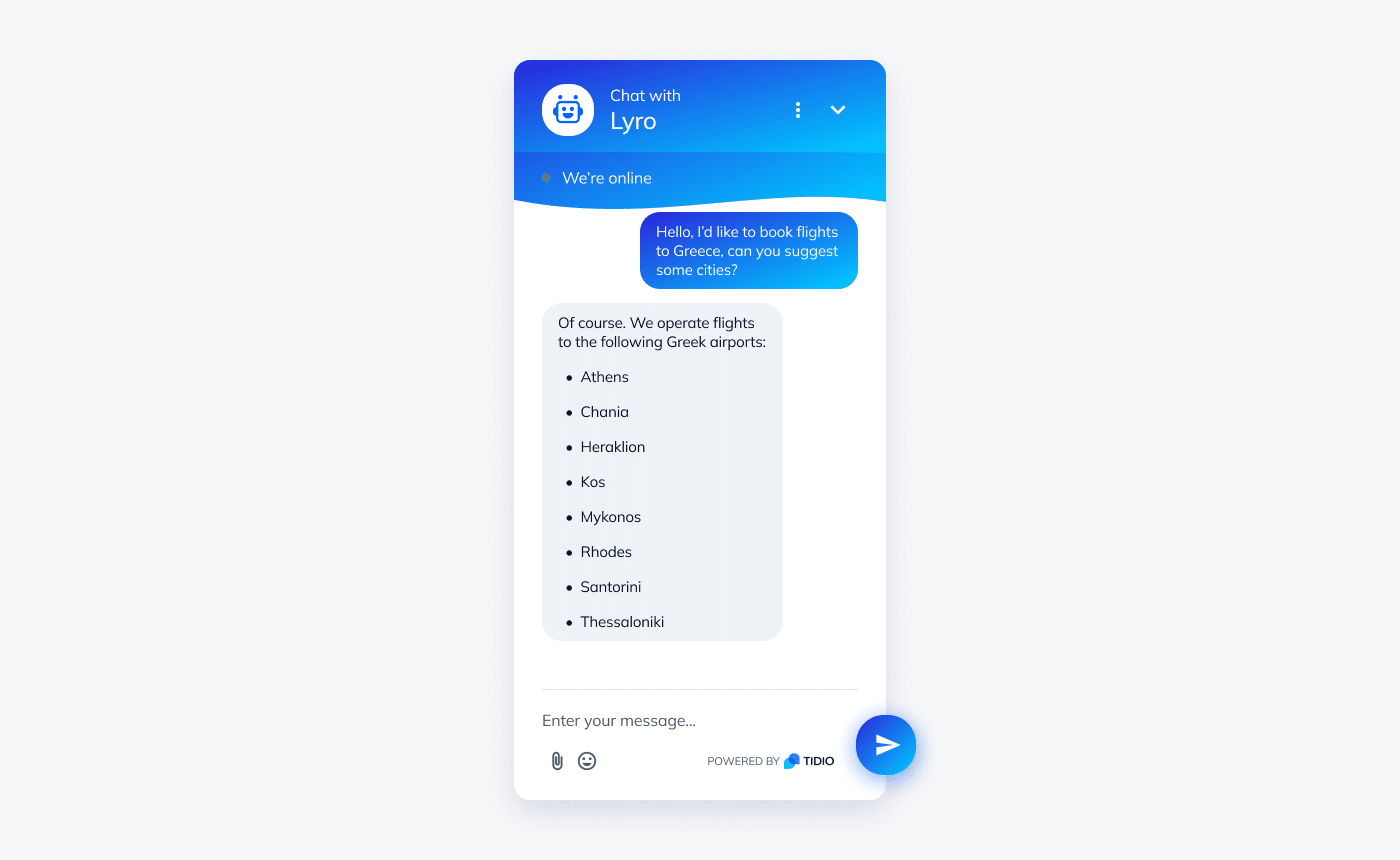
Lyro answers FAQs, provides recommendations, and takes contact details for bookings. This makes it easier for the human agents to focus on complex inquiries and assist travelers more efficiently.
Read more: Discover how Lyro helped Suitor achieve over 85% customer service automation.
AI for travel agents
AI can operate like an efficient personal assistant for travel agents. It answers customer questions instantly and handles all the tedious tasks so human reps can focus on creating unforgettable trips. The software isn’t here to replace your support team but rather to supercharge their abilities with various powerful automations.
These customer service automations include virtual assistants, AI chatbots, and general automations of repetitive tasks. They help travel agents organize schedules, track flights, and even suggest the best travel packages based on a client’s preferences. On top of that, they’re always-on and offer instant responses to customer service questions varying from visa requirements, weather updates, or flight changes. You can also use them to send booking confirmations, process payments, and even remind clients about upcoming trips.
Here’s an example of a platform that provides a travel-planning AI:
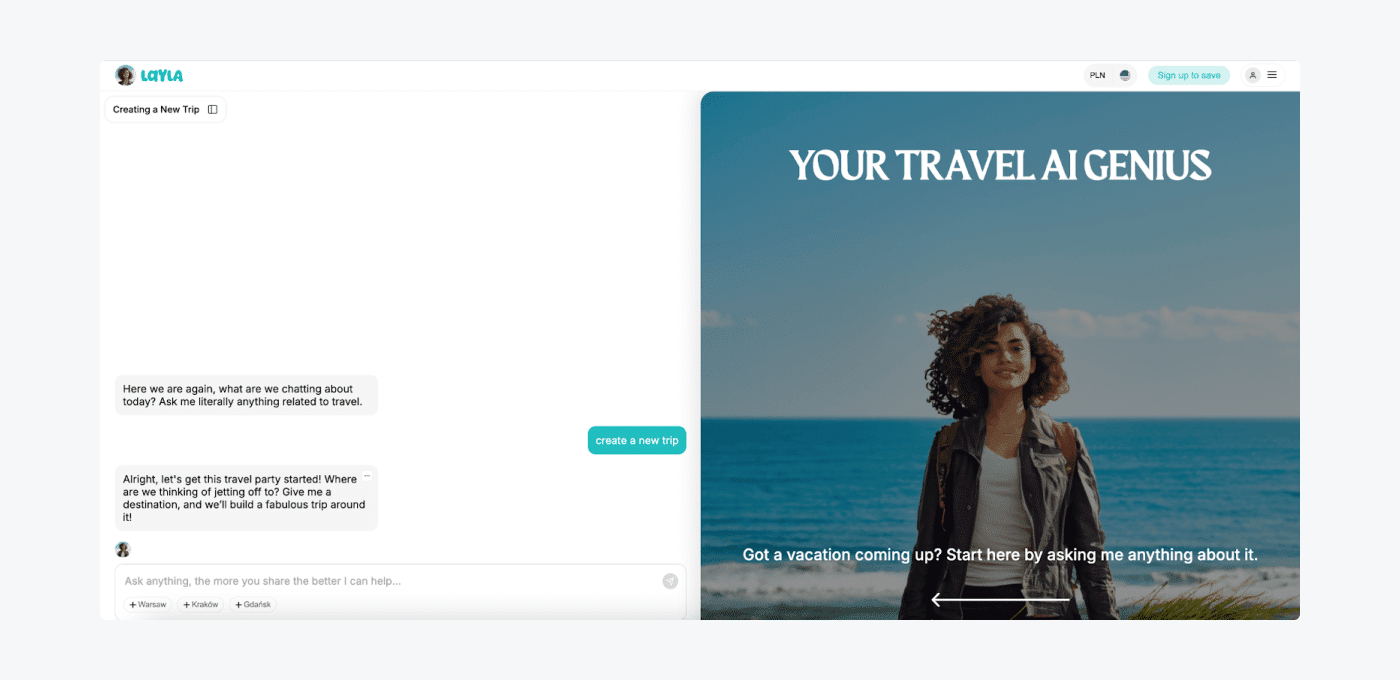
You can use Layla AI to get an itinerary for your next trip. This virtual trip planner asks you for a destination, dates when you want to get away, and any specifics you’d like to include in your travels. Then, the software provides you with a list of places to visit and things to do.
Airports are chaotic and fast-paced. On top of that, passengers need quick, accurate information here and now. Chatbots can come to the rescue here.
AI for airports
Whether it’s confirming a gate number, sending delay notifications, or guiding a lost passenger to their terminal, AI-powered chatbots streamline communication and reduce frustration. They can even assist with understanding security wait times and customs regulations, ensuring travelers know exactly what to expect before they reach the checkpoint.
Beyond just answering questions, chatbots can enhance the airport experience with interactive maps, food ordering, and duty-free shopping recommendations. Instead of wandering through terminals searching for a charging station or the best coffee, passengers can ask the chatbot and get instant directions. Some airports even integrate chatbots with transportation services, helping travelers book taxis, check public transport schedules, or find airport shuttles. All in a single chat.
Here’s an example from Lyon airport that implemented an AI travel chatbot on their website:
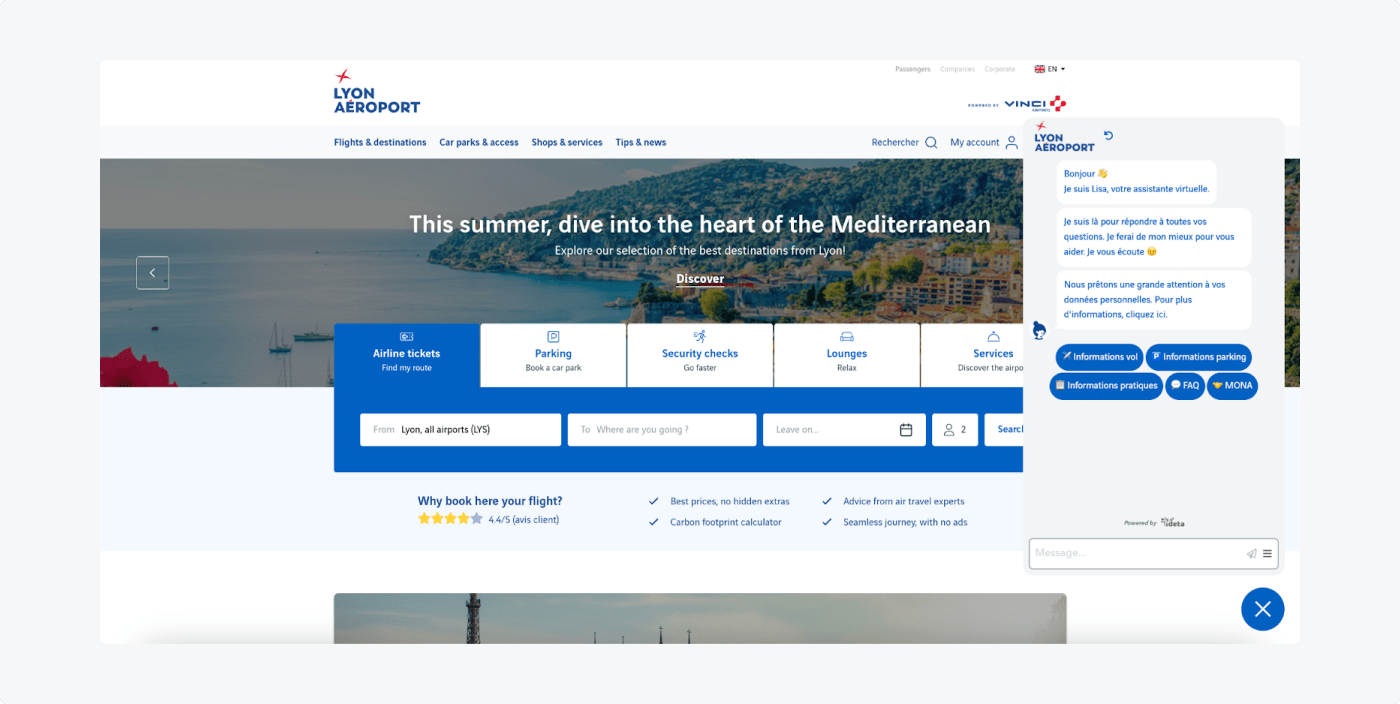
Aéroports de Lyon serves millions of passengers annually and uses an AI-powered chatbot to enhance the traveler experience. Their chatbot provides real-time flight updates, check-in assistance, and baggage support. It also helps passengers find shops, restaurants, and cafes based on their terminal, complete with recommendations and reservation options. But that’s not all. Travelers can access parking details, book spots in advance, and get automated FAQs.
Benefits of travel chatbots
AI technology is designed to meet the travel needs of customers, which, in turn, boosts customer engagement and improves user experience. But that’s not all. Here are the main benefits of AI travel assistants:
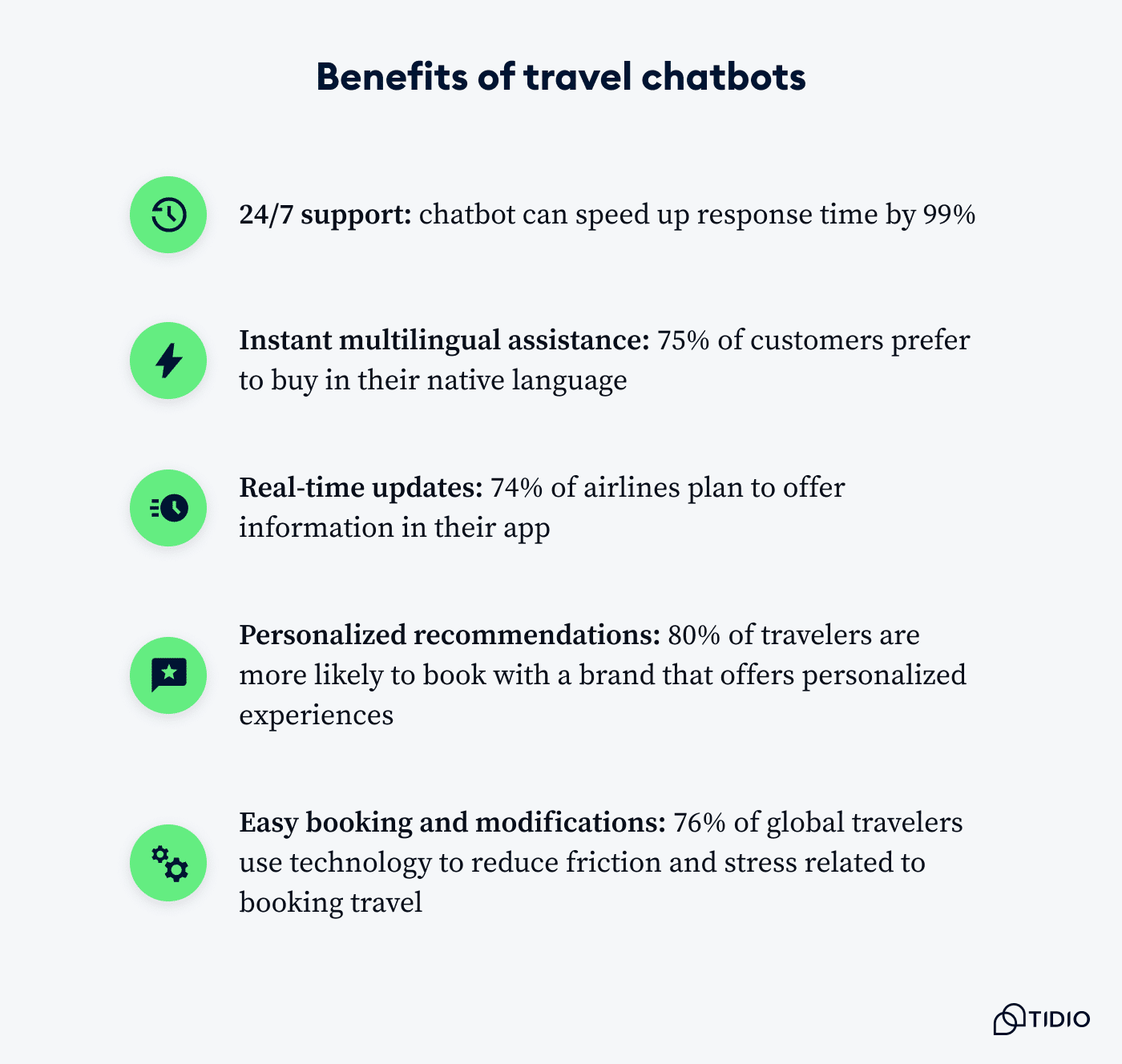
24/7 support
Travel can be an emotional rollercoaster. One moment, you’re excited about your dream vacation, and the next, you’re panicking because your flight got canceled. And when things go south, travelers need answers fast.
But here’s the problem: airlines, hotels, and agencies are often flooded with calls, leading to frustratingly long wait times.
That’s where a travel chatbot becomes a game-changer. An AI travel chat provides instant answers 24/7 and can answer up to 80% of inquiries automatically. So, whether your clients ask about rebooking a flight, checking baggage policies, or finding a last-minute hotel, the AI agent is there to assist them. In fact, studies show that by using chatbots, you can speed up customer response times by an impressive 99%. The stressful times of waiting on hold are over.
Instant multilingual assistance
Picture this: You’ve just landed in Tokyo, and your hotel booking isn’t showing up in their system. The receptionist only speaks Japanese, and your Google Translate skills aren’t cutting it. Frustrating, right?
No more.
A chatbot for travel industry can instantly communicate in multiple languages to help travelers navigate bookings, policies, and emergencies without the language barrier. Whether it’s a Spanish-speaking traveler needing a refund in France or a Chinese tourist looking for baggage info in New York, the chatbot ensures everyone gets the help they need.
It’s interesting to note that as many as 75% of consumers prefer to buy from brands that offer support in their native language. In the travel industry, where cross-border experiences are the norm, this is a necessity.
Read more: Discover how to build and use a multilingual chatbot to your advantage.
Real-time updates and alerts
Travel is unpredictable. Flights get delayed, gates change, weather disrupts itineraries—and the worst part? Most travelers don’t find out until it’s too late. Imagine rushing through an airport, only to realize your departure gate has moved across the terminal. Or worse, arriving at the airport only to discover your flight was canceled hours ago.
This is where real-time updates and alerts from a travel chatbot make all the difference.
Instead of refreshing airline apps or scanning departure boards, travelers get instant notifications. These include flight status, gate changes, baggage claim locations, and even weather-related disruptions. The chatbot proactively keeps travelers informed so they’re never caught off guard.
Airlines and airports are already expanding their digital offering. With 74% of airlines planning to offer wait time information in their apps and 54% of airports scheduled to provide updates to passengers’ mobile devices, travelers’ satisfaction is sure to boost shortly.
Personalized recommendations
Travel isn’t just about getting from Point A to Point B. It’s about the experience. But planning a perfect itinerary? That can feel overwhelming. With so many options—hotels, restaurants, attractions—travelers often spend hours researching the best choices, only to second-guess themselves later.
A chatbot for travel agencies with AI-driven personalized recommendations takes the guesswork out of planning. Based on a traveler’s preferences, past bookings, budget, and real-time location, the chatbot can suggest the best places to eat, attractions to visit, and routes to take.
Instead of scrolling through endless reviews, travelers get a tailor-made experience with zero effort. And since 80% of travelers are more likely to book with a brand that offers personalized experiences, travel businesses should jump on that train as soon as possible.
Let’s be honest—booking a trip can be a hassle. Searching for flights, comparing hotels, and juggling itineraries sometimes feels like a full-time job. And what happens when plans change? Modifying a booking often means navigating confusing websites or sitting on hold for hours.
Easy booking and modifications
A travel chatbot eliminates this frustration by allowing users to book flights, hotels, and activities instantly—all through a simple chat. Even better? When plans shift, modifications are just as easy. No need to dig through emails for booking codes or wait for a customer service rep on the line. The chatbot handles everything in seconds.
But here’s the real magic: engagement truly skyrockets when booking is frictionless. Instead of abandoning the process out of frustration, travelers get quick, intuitive assistance that keeps them excited about their trip and not stressed about the details. And over 76% of travelers seek apps that reduce travel frictions and stress.
Travel chatbot use cases
Chatbot for travel can answer FAQs, help with bookings, and work on multiple platforms including social media, WhatsApp, Messenger, etc. Moreover, generative AI can assist users in planning their trips. Here are some common use cases of travel chatbots:
1. Answer FAQs and customer support questions
Imagine this: You’re at the airport, rushing to catch a flight, and suddenly realize you’re unsure about the baggage weight limit. Do you search the airline’s website? Call customer service and wait on hold? No. You pull up the airline’s chatbot, type your question, and boom—instant answer.
So, how does it work?
Travel chatbots act as 24/7 virtual assistants, handling a wide range of customer queries without human intervention. They use AI to understand and respond to common traveler concerns like:
- Airline FAQs: Baggage policies, check-in times, delays, gate changes
- Hotel FAQs: Check-in/check-out times, amenities, and cancellation policies
- Travel agency FAQs: Visa requirements, travel insurance, itinerary changes
- Airport services: Directions to airport playgrounds, smoking areas, and lounges
- Visa & documentation assistance: Requirements for different destinations, processing times, and links to official government portals
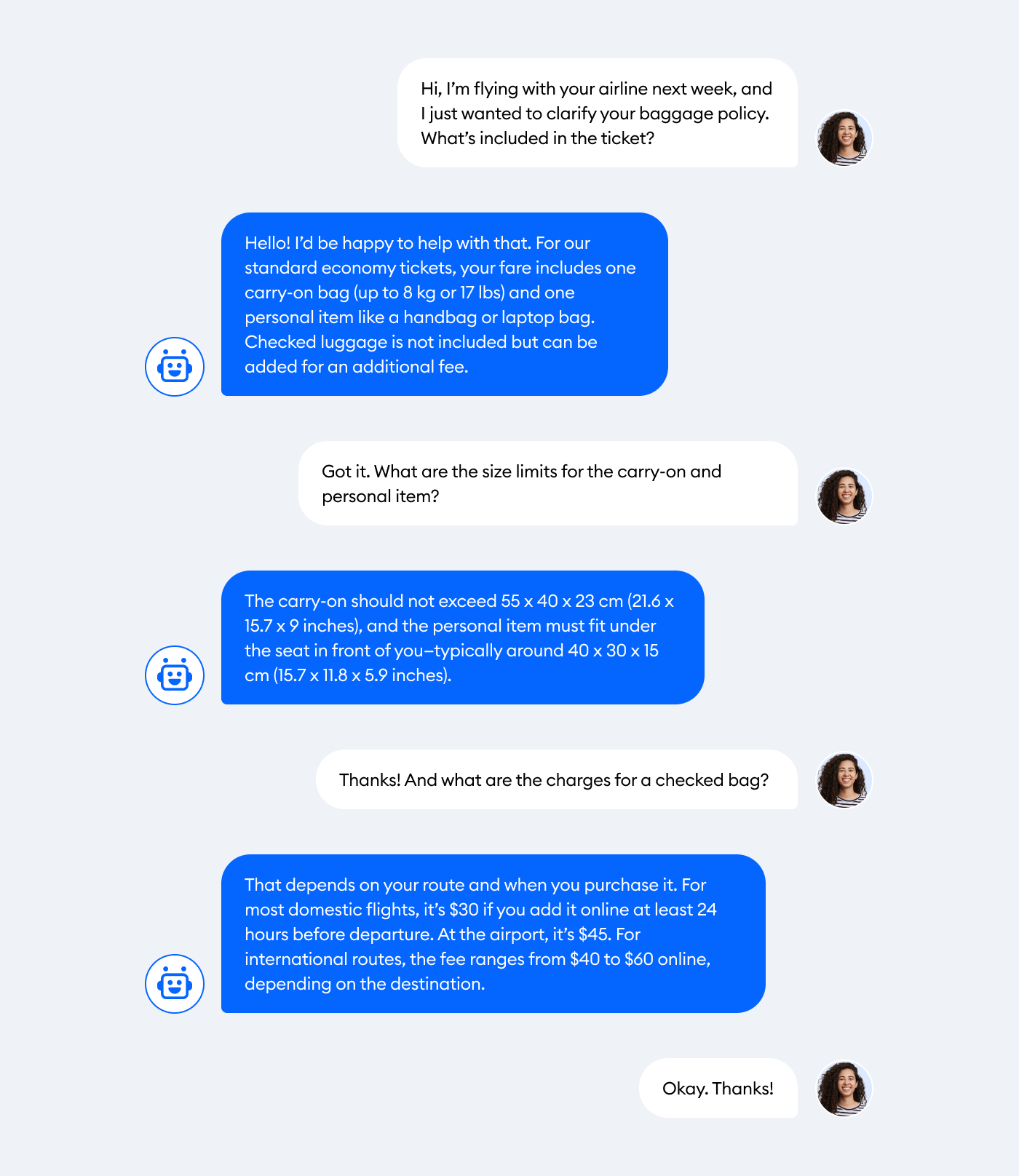
By handling these questions instantly, chatbots not only save time for travelers but also reduce the workload for customer service teams. And the best part? These bots never sleep. Whether it’s 3 AM or midday rush hour, they’re always ready to assist.
Read more: Learn how to build an FAQ for Lyro so it can answer your customers’ repetitive questions effectively.
2. Help with itinerary planning
Planning a trip can be overwhelming. Where should you stay? What’s the best local food? Which events are worth attending? An AI for travel itinerary acts like your personal travel assistant—offering recommendations and ensuring you make the most of your trip without endless Google searches.
Travel chatbots use AI and real-time data to recommend:
- Hotels: Based on budget, location, and guest ratings
- Restaurants: Suggesting top-rated spots for local cuisine or dietary preferences
- Events & Activities: Concerts, festivals, museums, outdoor adventures, and more
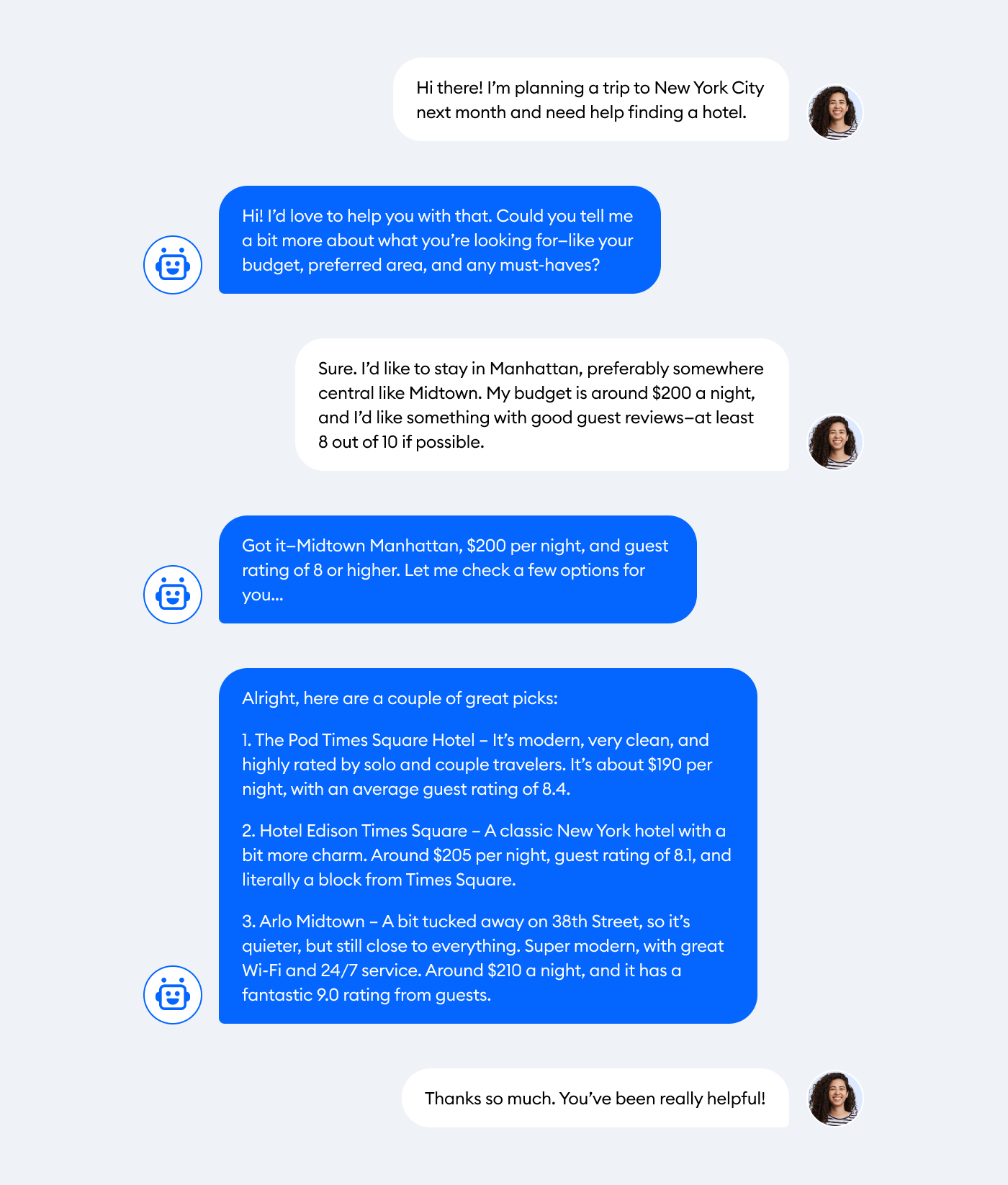
You simply tell the chatbot what you’re looking for, and it instantly provides suggestions. So, instead of juggling ten browser tabs and reading countless reviews, travelers get real-time, tailored recommendations, saving time and making trip planning stress-free.
3. Flight and hotel bookings
Booking a flight or hotel can sometimes feel like a never-ending maze. You need to compare prices, check availability, fill out forms, and, of course, make sure you’re getting the best deal. An artificial intelligence travel agent simplifies this entire process, acting as your personal booking assistant.
How, you may ask, does this work?
A chatbot streamlines the booking process by:
- Finding the best flights: Based on your budget, travel dates, preferred airlines, and layovers
- Recommending hotels: Matching preferences like price range, location, and guest reviews
- Handling reservations: Guiding users through the booking process, securing confirmations, and even making changes if needed
- Sending confirmations & reminders: Keeping all travel details in one place for easy access
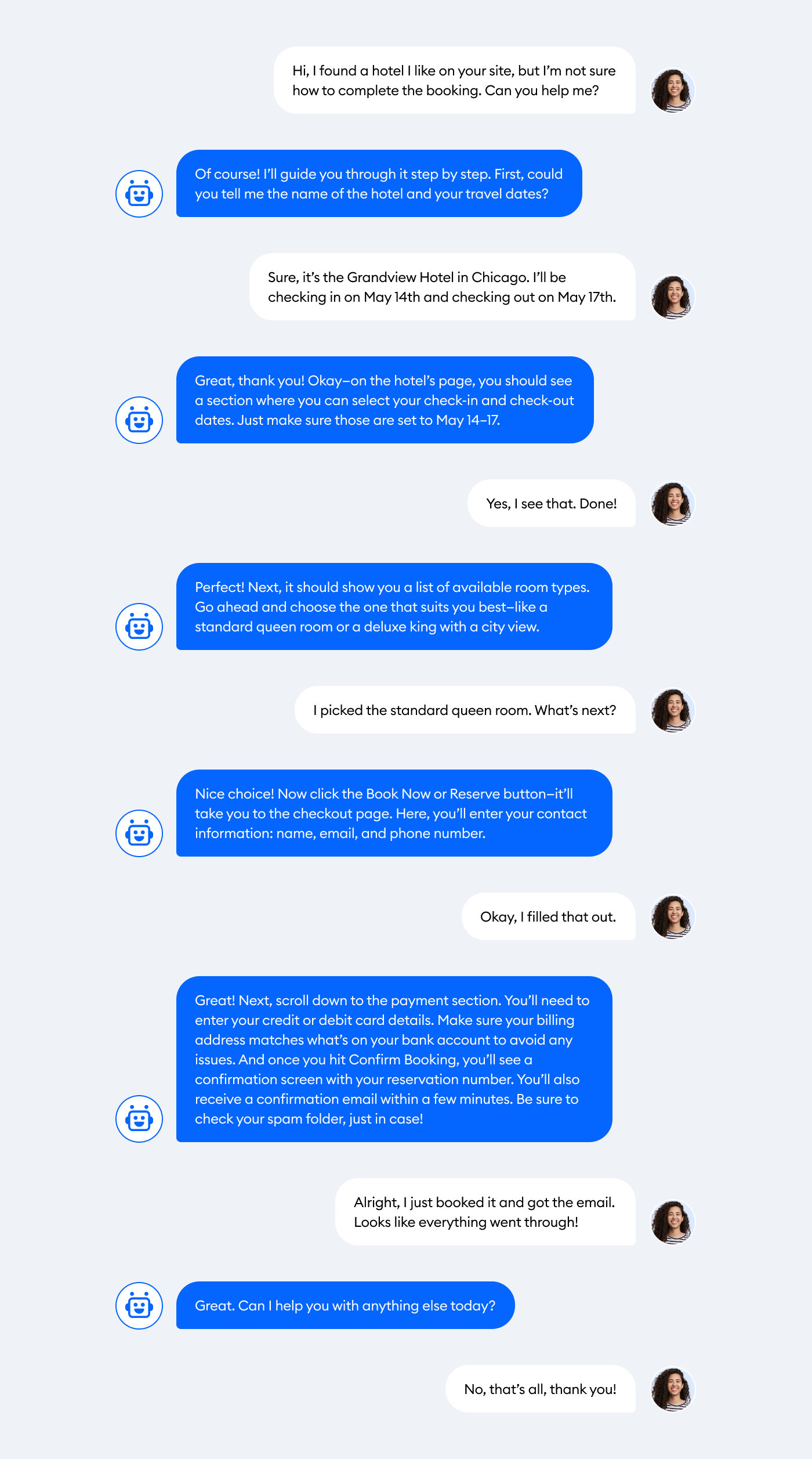
No more endless price comparisons. No more website hopping. Just a simple, conversational way to book travel—fast, easy, and stress-free.
4. Booking modifications and cancelations
Plans change—flights get delayed, hotels need to be rescheduled, and sometimes, life just happens. Instead of waiting on hold for a customer service agent, a travel chatbot can modify or cancel bookings in seconds.
A chatbot makes it easy to:
- Change flight dates & times: Check available options and rebook instantly
- Modify hotel reservations: Extend stays, switch rooms, or adjust check-in/out times
- Cancel bookings: Process cancellations, confirm refund policies, and initiate reimbursements
- Provide real-time updates: Notify travelers about policy changes, refund eligibility, and new booking options
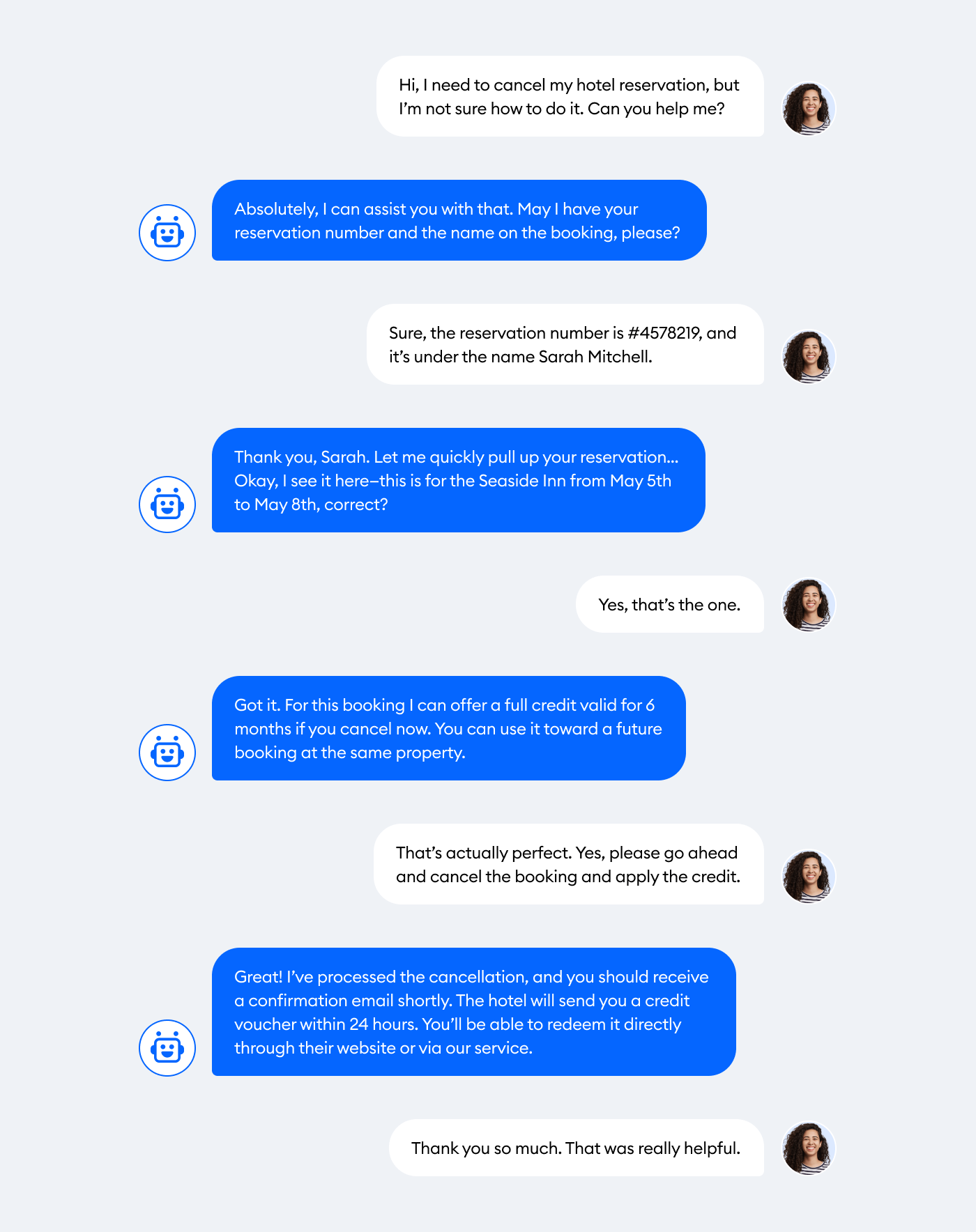
Booking modifications and cancellations are a high-volume, high-frustration part of the travel industry. A chatbot makes the process instant and efficient to boost your customer satisfaction while reducing operational costs.
5. Travel insurance and emergency assistance
Travel is exciting, but unexpected things can happen—missed flights, lost luggage, sudden illnesses. Dealing with insurance paperwork while stranded in a foreign country? That’s the last thing anyone wants. This is where travel chatbots step in, making the process of applying for travel insurance and filing claims fast, easy, and stress-free.
How does it work?
Travel chatbots provide:
- Application assistance: The chatbot guides travelers through choosing the right insurance plan, explaining coverage options (e.g., medical emergencies, trip cancellations, lost baggage), and helping with application forms
- Claims filing: If something goes wrong, users can submit claims directly through the chatbot—no confusing paperwork, no waiting on hold
- Claim status information: Travelers can ask the bot for real-time claim updates and estimated payout timelines
- Emergency assistance: In case of medical emergencies or trip disruptions, chatbots provide immediate guidance on the next steps, including emergency contacts and hospital recommendations
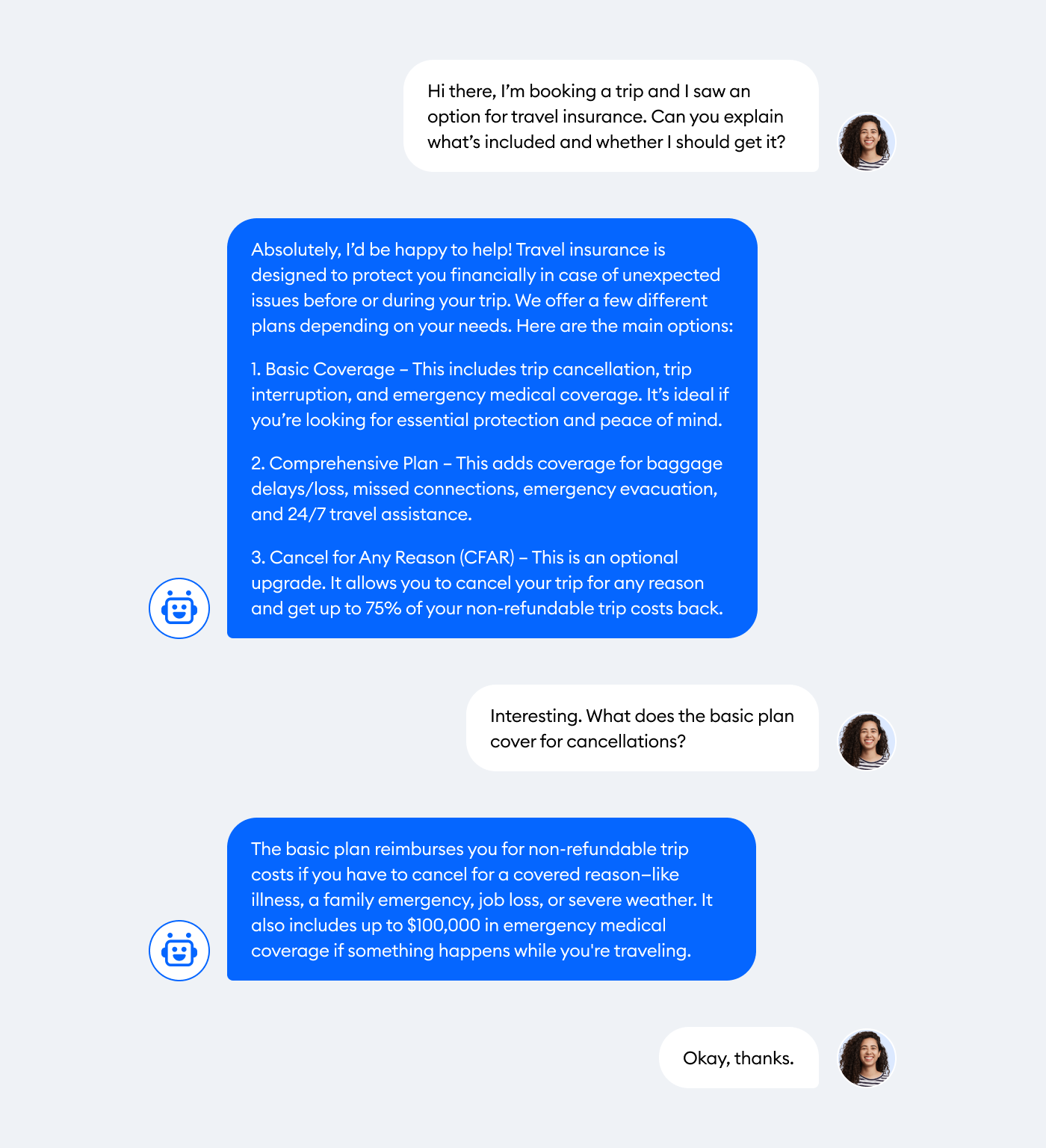
When the unexpected happens, you don’t want to deal with insurance bureaucracy while stuck in an airport or hospital. A chatbot removes the hassle, making sure help is available when you need it most.
Loyalty programs
Loyalty programs are a win-win for travelers and businesses. Travelers get rewards, and businesses build long-term customer relationships. But keeping track of miles, points, and promotions can be overwhelming. That’s where travel chatbots come in, making loyalty programs more accessible, engaging, and rewarding.
Travel chatbots can:
- Promote loyalty programs: Chatbots introduce travelers to airline and hotel loyalty programs, explaining benefits and helping them sign up
- Share miles and points balance: Users can quickly check their balance, recent transactions, and expiration dates without logging into a separate app
- Redeem rewards: The bot suggests how travelers can use their points—free flights, hotel stays, upgrades, or exclusive perks
- Provide exclusive member offers: Chatbots notify users about special promotions, bonus point opportunities, and upcoming deals
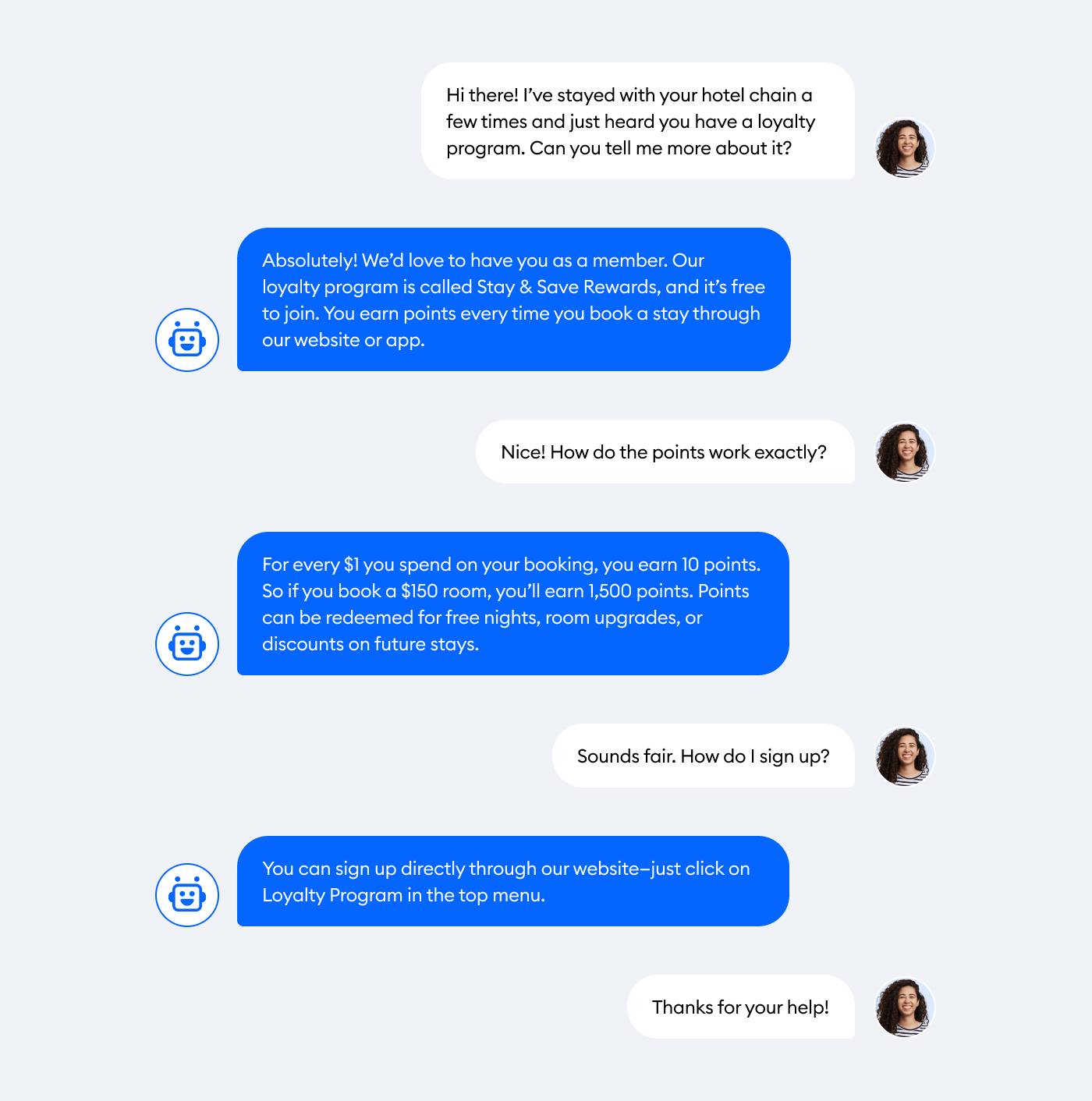
Most travelers don’t use their loyalty points simply because they forget about them. A chatbot ensures users stay engaged and maximize their rewards—without digging through emails or logging into multiple accounts.
Top AI travel chatbot providers
There are many travel bot platforms available on the market. It’s difficult to choose the right one for your business. That’s why we did the research for you. Here are descriptions, key features, and pricing comparisons of the top five travel AI tools:
| Tool | Rating | Free plan | Best for |
| Tidio | 4.7/5 ⭐️ | ✅ | Conversational AI |
| Zendesk | 4.3/5 ⭐️ | Free 14-day trial | Ticket management |
| Botsonic | 4.6/5 ⭐️ | ❌ | Multichannel functionality |
| Flow XO | 4.5/5 ⭐️ | ❌ | Built-in payment integration |
| Verloop.io | 4.7/5 ⭐️ | ✅ | Voice support |
Tidio
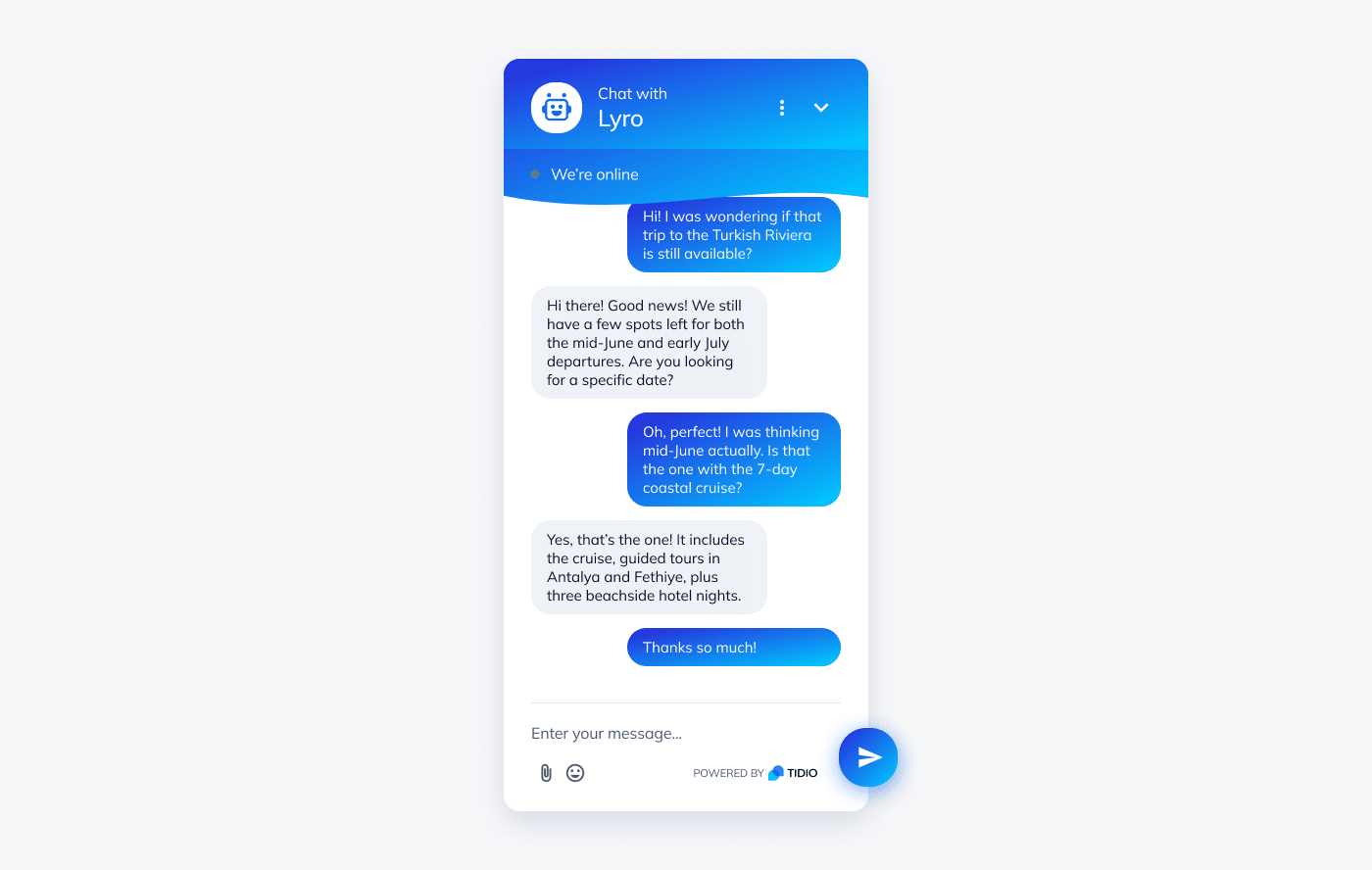
Rating: 4.7/5 ⭐️ (1,640+ reviews)
You can use Tidio’s conversational AI, Lyro, to automate bookings, answer FAQs, and provide real-time updates on flights and hotels. On top of that, this platform lets you offer personalized travel recommendations and multilingual support to ensure seamless communication with global travelers, and 24/7 availability reduces wait times. Lyro integrates with existing platforms, manages demand spikes, and resolves up to 70% of repetitive inquiries. This helps your human agents focus on complex cases that require human empathy and critical thinking.
Main features
- NLP and AI chatbots
- AI for email
- Shared inbox
- Automated ticket routing
- Product recommendations
Pricing:
- 7-day free trial available
- Free version available
- Starter ($24.17/mo)
- Growth (starts at $49.17/mo)
- Plus (starts at $749/mo)
- Premium (starts at $2999/mo)
Zendesk
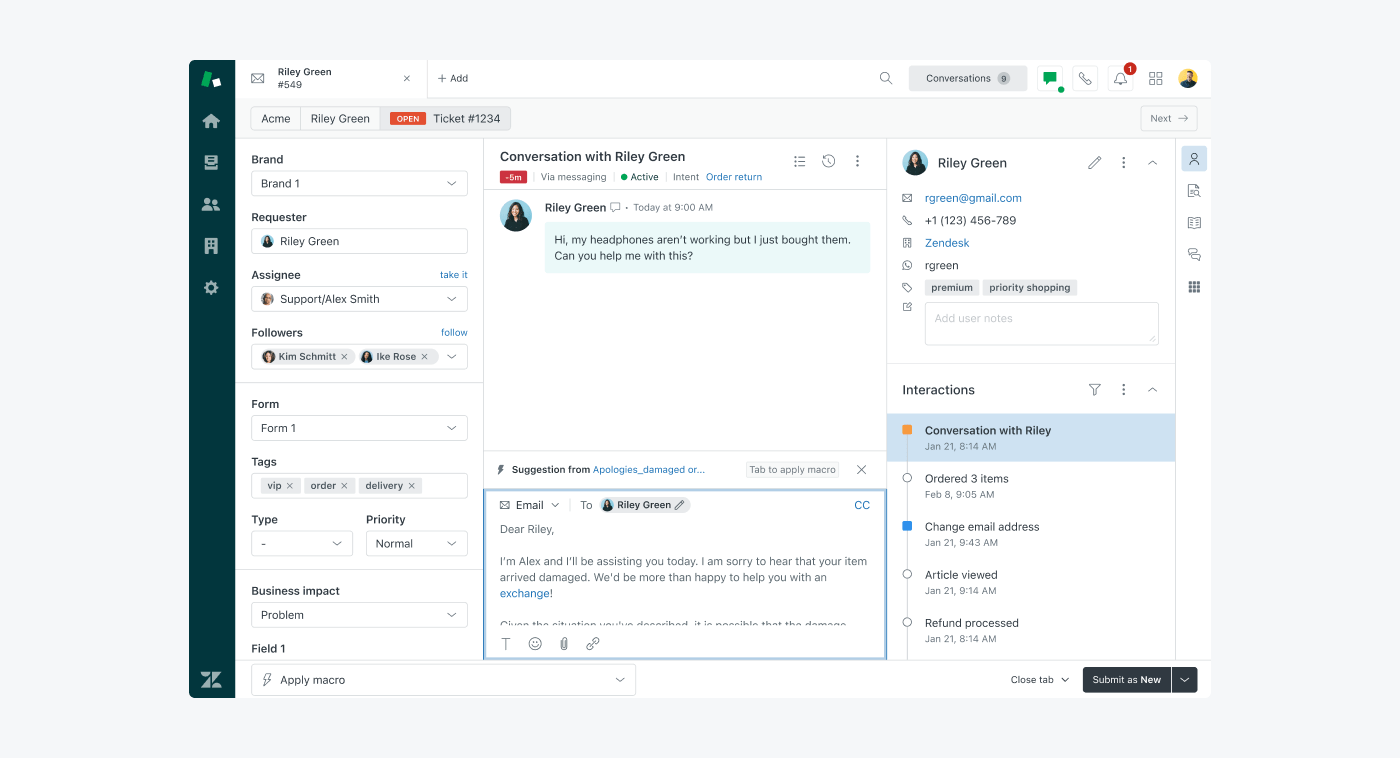
Rating: 4.3/5 ⭐️ (6,180+ reviews)
Zendesk combines AI-powered automation with real-time customer support to enhance the traveler’s experience. The chatbot can collect key details upfront, such as booking references and travel preferences, streamlining the handoff to a live agent when necessary. Zendesk offers an omnichannel approach that integrates live chat and self-service options within a unified workspace for seamless support across multiple touchpoints.
Main features:
- Unified inbox
- Ticket management
- Robust reporting
- Free 14-day trial available
- Suite Team ($55/mo/agent)
- Suite Growth ($89/mo/agent)
- Suite Professional ($115/mo/agent)
- Suite Enterprise and Suite Enterprise Plus → Talk to sales
Botsonic
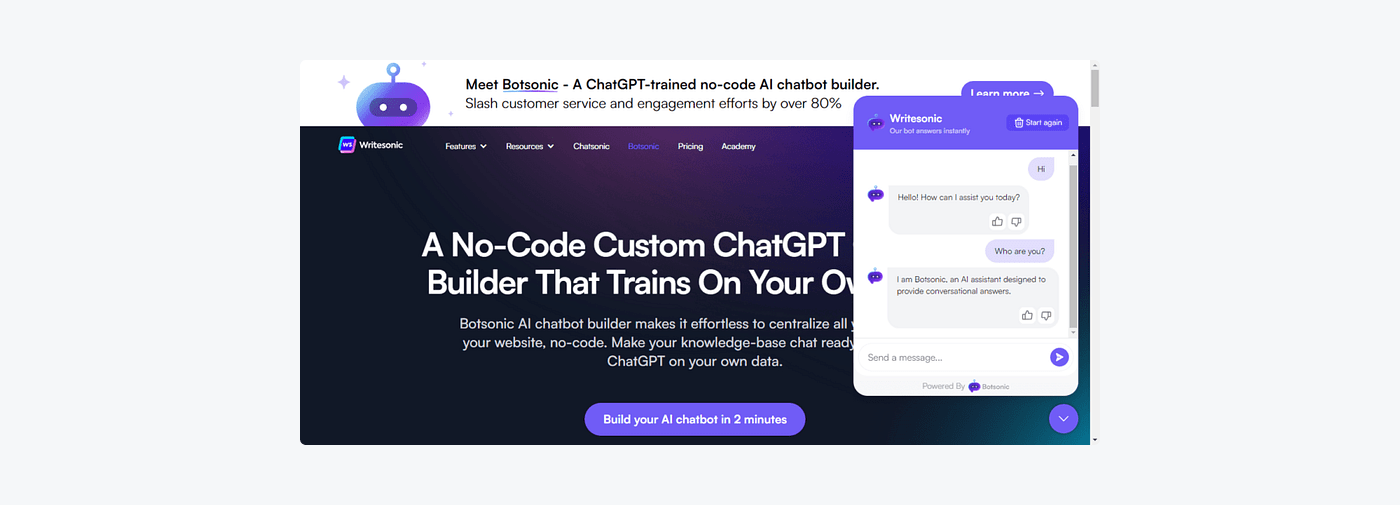
Rating: 4.6/5 ⭐️ (90+ reviews)
Botsonic offers a no-code, highly customizable travel chatbot builder powered by GPT-4 and natural language processing (NLP). This allows travel businesses to create a chatbot that understands and responds to customer queries using their own company data. Additionally, Botsonic enables seamless integration across various platforms using API keys and basic scripts.
Main features
- Multichannel functionality
- Customizable chat widget
- AI automations available
- Starter ($19/month)
- Professional ($49/month)
- Advanced ($299/month)
- Enterprise → talk to sales team
Flox XO
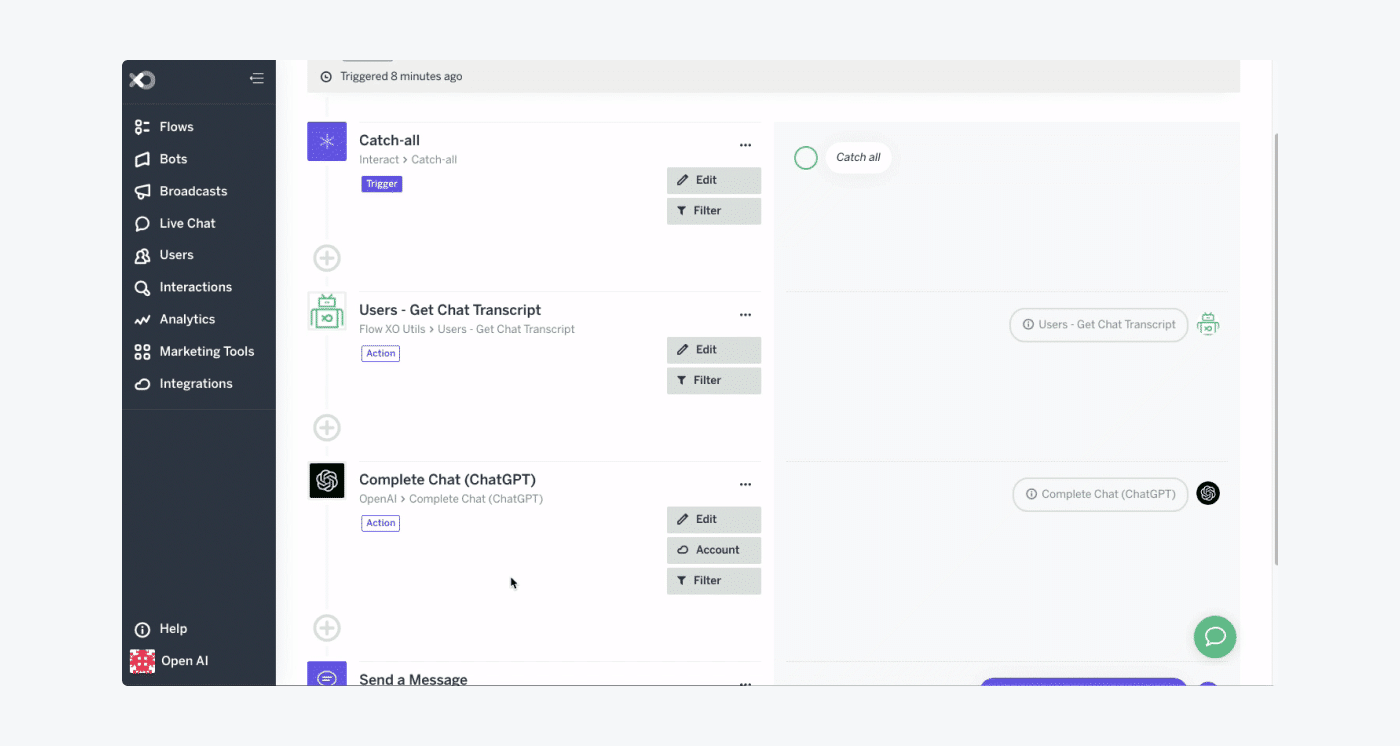
Rating: 4.5/5 ⭐️ (6+ reviews)
Flow XO is one of the best AI travel tools that provides a code-free way for travel businesses to automate customer interactions and streamline bookings. With its ability to collect key traveler information, such as email addresses and preferences, Flow XO helps travel companies personalize customer experiences while simplifying trip planning. On top of that, the chatbot can greet visitors, answer frequently asked questions, and even send helpful links to web pages.
Main features:
- Built-in payment integration
- Easy-to-use chatbot builder
- Attachments available
- Standard plan ($25/month)
- Add-on 5 bots or active flows (+ $10/month)
- Add-on 25,000 interactions (+ $25/month)
- Additional team member (+ $5/month)
- Add-on 100 AI credits (+ $1/month)
Verloop.io
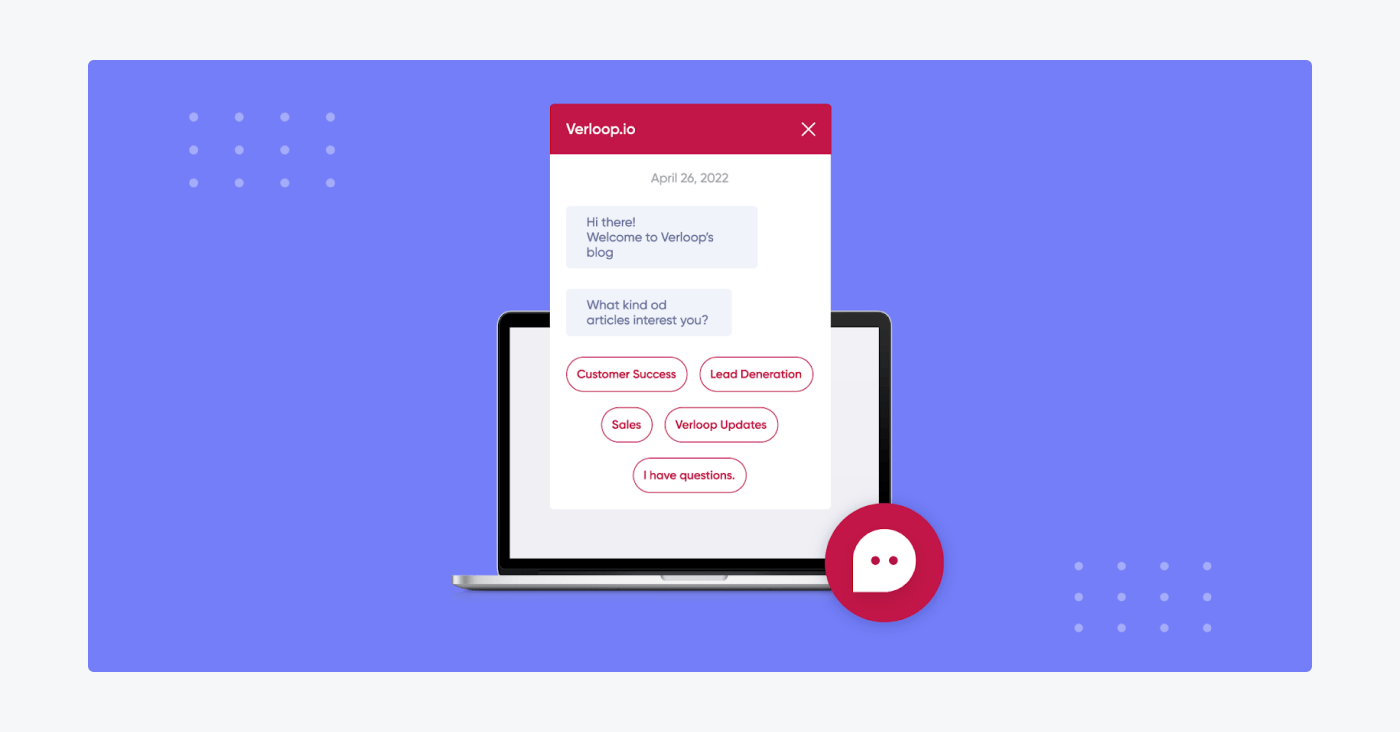
Rating: 4.7/5 ⭐️ (290+ reviews)
Verloop.io is a powerful travel chatbot solution that enhances customer support and streamlines travel bookings with AI-driven automation. One of its key strengths is multilingual support for over 20 international languages, making it an excellent choice for travel businesses serving a global audience. Additionally, Verloop.io chatbots can handle essential travel tasks such as personalized itinerary recommendations, booking confirmations, and cancellation requests.
Main features:
- Voice support
- Drag-and-drop interface
- Omnichannel support
- Free starter plan
- Enterprise → talk to sales
How to use a travel chatbot?
Before deploying a travel chatbot, you need a clear strategy. This is all about planning. So, start by clearly identifying what the chatbot should achieve, like answering FAQs or assisting with flight searches.
Importantly, establish key performance indicators (KPIs) to measure the chatbot’s effectiveness. These could include resolution rate, waiting time, or customer satisfaction, sales, headcount, etc.
For example, Tidio’s conversational AI, Lyro, can help you achieve a 70% resolution rate and decrease response times by 80%. Companies use Tidio to answer customer service questions, offer deals in real time, collect contact information, and much more.
And you can also achieve these results. Believe it or not but the setup of an AI chatbot is easier than ever.
With Tidio, all you need to do is insert your knowledge base and FAQs links to the Lyro’s training system. The software will then scrape all of the question-answer pairs to create data sources.
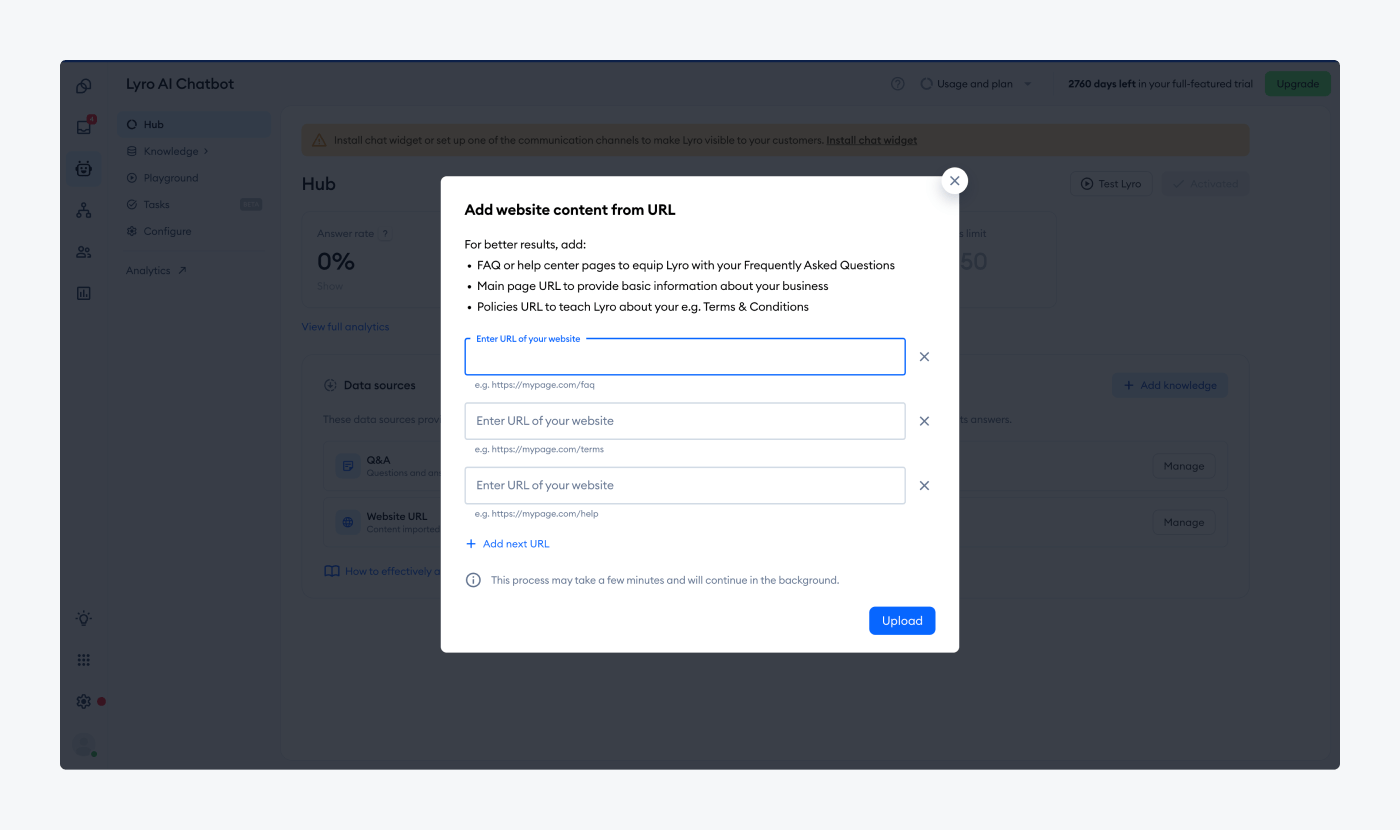
Lyro will use only this data to answer your customer inquiries in order to minimize the risk of misinforming your clients (AI hallucinations). Once you test your chatbot in the Playground section, you can deploy it to your website.
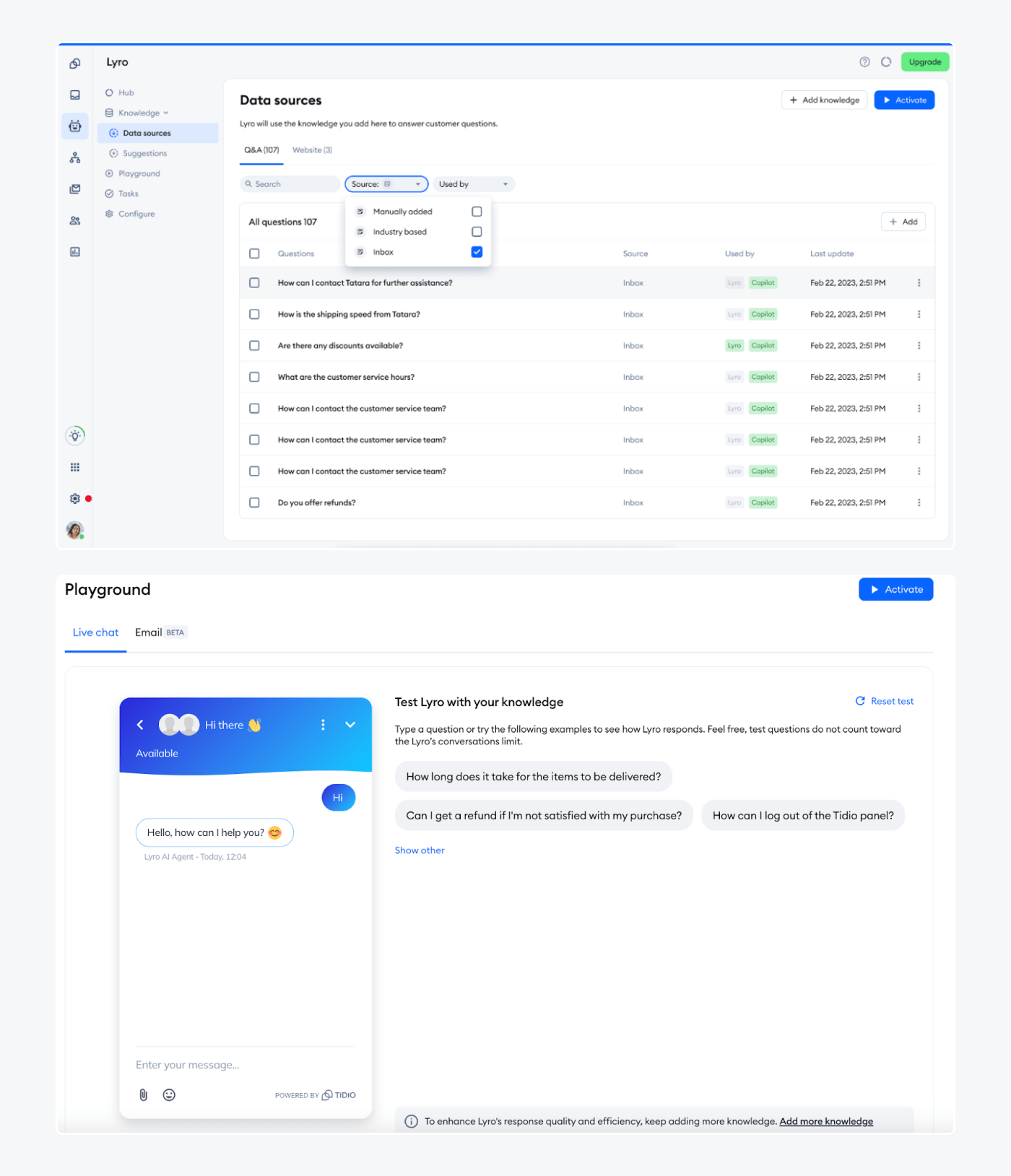
Implementing artificial intelligence presents exciting opportunities but also several significant obstacles. Some of the major hurdles are the complexity of training the AI and the need for a human touch in customer service.
Luckily, businesses using Lyro AI Agent can benefit from a simple setup. Lyro learns automatically from the provided link to the company’s FAQs and other resources. On top of that, it communicates in a natural language and when the software doesn’t have the needed information, it seamlessly transfers the user to a human representative.
Automate your travel business
Travel is unpredictable, but customer service doesn’t have to be.
AI-powered travel chatbots bridge the gap between traveler expectations and business efficiency, providing instant, round-the-clock support. One of these AI agents is Lyro.
Whether it’s answering FAQs, rebooking flights, or offering real-time updates, this virtual assistant transforms chaotic travel experiences into smooth, stress-free journeys. And with the ability to communicate in multiple languages and personalize recommendations, it doesn’t just automate support—it enhances it.
The future of travel isn’t just about getting from point A to point B. It’s about making the journey as effortless as possible. With AI-powered chatbots, you can eliminate friction, delight customers, and scale operations without compromising on service quality.

